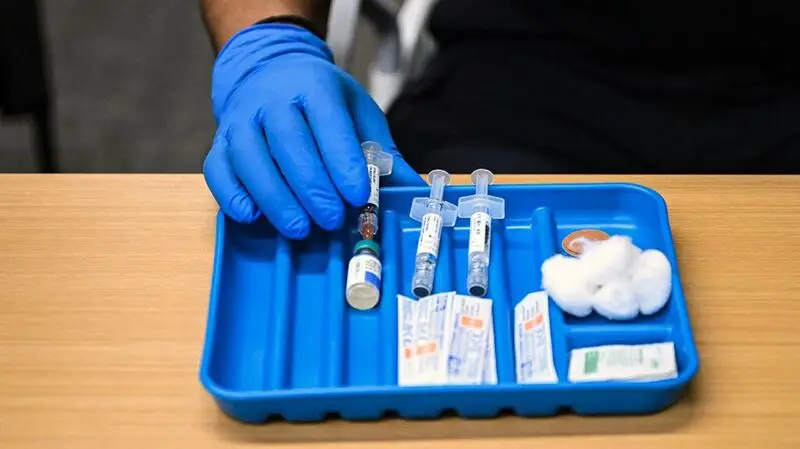
- With an ongoing measles outbreak across the United States, some questions about the best protective measures have emerged.
- Health and Human Services Secretary Robert F. Kennedy Jr. has joined other experts and expert medical bodies in endorsing measles vaccination as the best way to ensure protection against infection.
- However, depending on when and what type of measles vaccine a person has had, they may need to get a vaccine booster to ensure continued protection.
According to official data from the Centers for Disease Control and Prevention (CDC), as of April 3, 2025, there have been a total of
Of these, 97% of cases occurred in individuals who were either unvaccinated or whose vaccination status remains unknown.
The consensus remains that vaccination is the best way to protect against measles. United States Health and Human Services Secretary Robert F. Kennedy Jr. has been the latest official to endorse vaccination as “The most effective way to prevent the spread of measles.”
The vaccine currently in use, referred to as the MMR vaccine, actually confers protection against mumps and rubella as well as measles, hence the abbreviation. Kennedy Jr. has also instructed the CDC to “supply pharmacies and Texas-run clinics with needed MMR vaccines and other medicines and medical supplies.”
Typically, if following recommendations, children will receive
Receiving a single dose of the vaccine confers 93% protection against measles.
People who have had MMR vaccination are protected for life. However, the current vaccine,
This raises the question: Should people who have already received a measles vaccine at any point receive a booster to ensure continued immunity?
Medical News Today has asked David Cutler, MD, a board certified family medicine physician at Providence Saint John’s Health Center in Santa Monica, CA, to help answer these and other related questions.
Cutler pointed out that “there will remain some uncertainty about the risk posed by measles to any one individual due to several factors.”
These include:
- how common measles infections are in their community
- to what extent the individual and their community have achieved immunity to measles either by prior infection or through vaccination
- how vulnerable the individual is to measles infection.
First of all, what is a vaccine booster, exactly, and what does it do?
“A booster vaccine, just like an initial vaccine, will initiate or augment a person’s immune protection against measles,” Cutler explained.
It acts as a “reminder” to the body’s immune system to “watch out” for a specific pathogen that it has already become “trained” to fight against through the initial vaccination.
The first MMR vaccine became
So, if you are an adult who was vaccinated in childhood when exactly you got the measles vaccine may determine whether or not you would benefit from a booster. Other factors are at play, too, as Cutler noted.
“Adults born before 1957 are considered immune to measles because they almost certainly had the disease during childhood,” the physician explained.
He told us that blood tests are available for people who want to clarify their immune status and determine whether or not they should get a measles vaccine booster. That is the Immunoglobulin G (IgG) blood test:
“Adults born after 1957 were probably vaccinated as children but may have received a less effective inactivated virus vaccine between 1963 and 1967. Anyone who is unsure of their immune status can get a blood test for measles antibody to determine their immunity. Finding sufficient IgG antibodies to measles means you are immune.”
To summarise, “you might need a booster if you are a child who only received one dose of vaccine, an adult who received the inactivated vaccine, a high-risk adult who may be exposed to measles, or anyone whose blood test shows a lack of immunity,” said Cutler.
“An adult who is certain they never had the disease, never had the vaccine, and has no factor posing undue risk from the vaccine should get the measles vaccine,” he emphasized.
“Current recommendations are that children receive two doses of measles vaccine,” Cutler reiterated. Meanwhile, “adults at average risk should have at least one dose of vaccine at some time in their lives.”
However, Cutler pointed out that some social categories should get two doses of the MMR vaccine in adulthood if they have not had the vaccine already, as they may face a higher risk of infection compared to their peers.
According to the physician, “adults at particularly high risk” of measles include:
- healthcare workers
- people who travel internationally on a regular basis
- and students at post-secondary institutions.
The only adults who have never been vaccinated against measles who may not wish to get vaccinated are those who may face health risks from receiving a live virus vaccine — and the MMR vaccine counts as such.
“The only currently available form of the measles vaccine is the combination MMR vaccine containing live, attenuated measles, mumps, and rubella (German measles) virus,” Cutler explained.
People who may experience serious adverse reactions to attenuated live vaccines could include:
- people with severe allergic reactions to an ingredient in the vaccine formulation
- people with certain forms of immunodeficiency
- and people receiving immunosuppressive biological therapy.
However, even in such cases, the decision whether or not to receive a vaccine is not clear-cut—it all comes down to weighing the potential risks and benefits and figuring out the safest approach.
“Balancing risks and benefits can be complicated for certain individuals who have greater vulnerability,” Cutler noted.
“This is why it is important to consult with your primary care physician regarding whether measles or any vaccine may be appropriate for you,” he advised.





